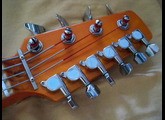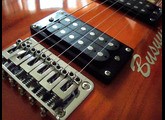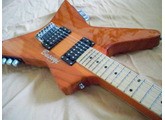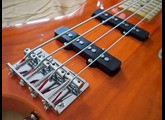« A Budget Instrument That Offers a Lot »
Published on 06/20/21 at 06:49
Best value:
Excellent
Audience:
Anyone
I was in the market for a bass, since I’ve been doing far more composition lately and wanted to add some unique (and melodic) bass lines to the premade Band-in-a-Box backing track program I use. I’m not sure where I saw it, likely a video that popped up in my YouTube feed, but found the Busuyi double neck guitars rather intriguing and unique. For those interested, Busuyi has a few different, yet similar translations or meanings: Add to my dignity; add to wealth; add to honor. There are some Busuyi models that have two separate necks, whereas this model (the Mini-Pro Traveler with a Dean ML type body shape) has one integrated neck. In either instance, for a different instrument you flip it over, thus providing you bass and six-string options (other models include 6-12 string combinations).
Each ‘half’ of the instrument has its own controls. One knob is the tone control, whereas the other two knobs are the volume controls for the neck and bridge pickups. This allows you to hear one and not the other, or you can blend the two. In the video demo, I blended the two for both bass and six-string, since I preferred the sounds with my select amp/cab gear. The body is basswood and the neck is maple, together with 22 nickel frets.
In regard to sound, the bass is very clear with decent punch, although if you back off on the bridge pickup you get a fatter ‘Dazed and Confused’ sound. A further range of usable tones are possible whether plucking toward the bridge versus the neck. The guitar pickups are very clear and on the bright side. They have serious ‘cut through the mix’ characteristics, and this is where blending both pickups seem to work best (to my ears). For most of the demo I had both neck and bridge around 90% blend, with the tone control about mid-way. The tone control offers a good range for the bass, but it’s really noticeable with the guitar – warm (yet clear) to very bright. Definitely no ‘mud’ with these pickups.
In regard to playability, the thick square neck is a different beast, although I became used to it in a matter of minutes. I have small hands, but found having my thumb behind the neck a non-issue. When playing the upper register (particularly for lead), it was more comfortable to run my thumb along the bottom edge of the neck, which is smooth and allows the hand to glide effortlessly. Again, a slightly different playing requirement, but I could do what I wanted (although, I suspect, shredders may have issue with the design). I like the body design in general, but as a bonus, it allows for both ‘casual’ and ‘classical’ playing when seated. This does make upper note playing more effortless and it’s nice to switch positions to keep stiffness down when playing for long periods.
Certainly, most guitars have short-comings, and I’ll address those. Keep in mind this dual instrument retails for $325 USD. Consequently, I would not expect similar standards compared to my $4k Music Man Majesty, and so, any minor issues are completely forgivable (since they do not affect playability or sound). First, the pickups and electronics may be generic, but they are very quiet, no crackling noise, hum, etc., which is a good thing and not a short-coming. However, the six-string pickups are not meant for hard rock or metal. I think they are very passable for lead (and, again, do they ever cut through the mix!), but not for power chords, chugging, etc., as they sound slightly harsh with the hi-gain stuff. Turning down the treble certainly helps, however, but the six-string pickups on this model are meant for cleans and soft-rock (slightly driven tones), where they shine best. Any ‘edge’ to the frets is minimal – nothing sharp or noticeable while I play, but only minor edging on a few frets if I run my fingertips along the edge. Both bass and six-string sides of the instrument had a few areas of fret buzz, but so little that I cannot hear it while plugged in and playing. Raising the string saddles slightly would eliminate any buzzing, but with such low action and not hearing it while playing or recording made it a non-issue. I had to intonate one string, which took about 30-seconds. There is one very small mark in the finish on the six-string side, but I could have done that in the process of taking it out of the box and playing around with it. You have to look closely to see it.
Overall, considering the price of this instrument and what you get for the money, any negatives are completely forgivable and do not affect sound or performance. I like the clear punchy bass tone, and the six-string is so clear and sparkly, that it, too, found a home whenever I need that sizzle and bite. I would be curious to try Busuyi’s higher end productions, including those with separate necks and a headless model. These are such great considerations for someone on a budget and looking to have both bass and guitar (or a 6 and 12 string). Obviously, such combinations make it practical for travel, since you only need to carry one instrument, rather than two.
Each ‘half’ of the instrument has its own controls. One knob is the tone control, whereas the other two knobs are the volume controls for the neck and bridge pickups. This allows you to hear one and not the other, or you can blend the two. In the video demo, I blended the two for both bass and six-string, since I preferred the sounds with my select amp/cab gear. The body is basswood and the neck is maple, together with 22 nickel frets.
In regard to sound, the bass is very clear with decent punch, although if you back off on the bridge pickup you get a fatter ‘Dazed and Confused’ sound. A further range of usable tones are possible whether plucking toward the bridge versus the neck. The guitar pickups are very clear and on the bright side. They have serious ‘cut through the mix’ characteristics, and this is where blending both pickups seem to work best (to my ears). For most of the demo I had both neck and bridge around 90% blend, with the tone control about mid-way. The tone control offers a good range for the bass, but it’s really noticeable with the guitar – warm (yet clear) to very bright. Definitely no ‘mud’ with these pickups.
In regard to playability, the thick square neck is a different beast, although I became used to it in a matter of minutes. I have small hands, but found having my thumb behind the neck a non-issue. When playing the upper register (particularly for lead), it was more comfortable to run my thumb along the bottom edge of the neck, which is smooth and allows the hand to glide effortlessly. Again, a slightly different playing requirement, but I could do what I wanted (although, I suspect, shredders may have issue with the design). I like the body design in general, but as a bonus, it allows for both ‘casual’ and ‘classical’ playing when seated. This does make upper note playing more effortless and it’s nice to switch positions to keep stiffness down when playing for long periods.
Certainly, most guitars have short-comings, and I’ll address those. Keep in mind this dual instrument retails for $325 USD. Consequently, I would not expect similar standards compared to my $4k Music Man Majesty, and so, any minor issues are completely forgivable (since they do not affect playability or sound). First, the pickups and electronics may be generic, but they are very quiet, no crackling noise, hum, etc., which is a good thing and not a short-coming. However, the six-string pickups are not meant for hard rock or metal. I think they are very passable for lead (and, again, do they ever cut through the mix!), but not for power chords, chugging, etc., as they sound slightly harsh with the hi-gain stuff. Turning down the treble certainly helps, however, but the six-string pickups on this model are meant for cleans and soft-rock (slightly driven tones), where they shine best. Any ‘edge’ to the frets is minimal – nothing sharp or noticeable while I play, but only minor edging on a few frets if I run my fingertips along the edge. Both bass and six-string sides of the instrument had a few areas of fret buzz, but so little that I cannot hear it while plugged in and playing. Raising the string saddles slightly would eliminate any buzzing, but with such low action and not hearing it while playing or recording made it a non-issue. I had to intonate one string, which took about 30-seconds. There is one very small mark in the finish on the six-string side, but I could have done that in the process of taking it out of the box and playing around with it. You have to look closely to see it.
Overall, considering the price of this instrument and what you get for the money, any negatives are completely forgivable and do not affect sound or performance. I like the clear punchy bass tone, and the six-string is so clear and sparkly, that it, too, found a home whenever I need that sizzle and bite. I would be curious to try Busuyi’s higher end productions, including those with separate necks and a headless model. These are such great considerations for someone on a budget and looking to have both bass and guitar (or a 6 and 12 string). Obviously, such combinations make it practical for travel, since you only need to carry one instrument, rather than two.




